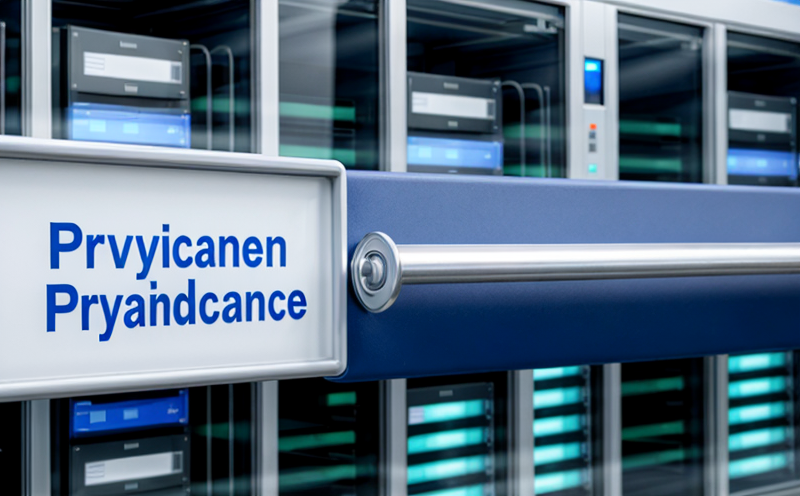
-
Pharmaceutical Compliance-
Pharmaceutical IT and Cybersecurity Compliance-
Compliance with Privacy Laws for Pharmaceutical IT Systems
We provide comprehensive solutions designed to help our clients mitigate risks, enhance performance, and excel in key areas such as quality, health & safety, environmental sustainability, and social responsibility.
Discover
For many years, our organization has been operating successfully, boasting modern laboratories that meet international standards. These laboratories are equipped with the latest technology devices and equipment, and we have built a strong team of experienced and trained personnel to operate them.
DiscoverWelcome to Eurolab, your partner in pioneering solutions that encompass every facet of life. We are committed to delivering comprehensive Assurance, Testing, Inspection, and Certification services, empowering our global clientele with the ultimate confidence in their products and processes.
Discover
-
Pharmaceutical Compliance-
Pharmaceutical IT and Cybersecurity Compliance-
Compliance with Privacy Laws for Pharmaceutical IT SystemsCompliance with Privacy Laws for Pharmaceutical IT Systems
The pharmaceutical industry relies heavily on Information Technology (IT) systems to manage patient data, clinical trials, and supply chains. However, these IT systems often handle sensitive and confidential information that must be protected in accordance with various national and international laws. Compliance with privacy laws is essential to prevent data breaches, protect patients rights, and maintain the integrity of pharmaceutical companies.
Global Regulatory Framework
The global regulatory framework for pharmaceutical IT systems is complex and multifaceted. Key regulations include:
GDPR applies to any organization processing personal data within the European Union, while HIPAA specifically addresses protected health information (PHI) in the United States.
2. How can pharmaceutical companies ensure compliance with multiple regulations?
Implementing a robust IT system that is designed to meet regulatory requirements and maintaining ongoing training and awareness programs for employees
3. What are some best practices for handling PHI under HIPAA?
Restrict access to authorized personnel only, maintain audit logs, and develop incident response plans in case of a breach.
4. How can pharmaceutical companies ensure data protection by design (DPD)?
Implementing DPD principles such as data minimization, transparency, and security by design throughout the IT systems lifecycle.
5. What is the role of external experts in ensuring compliance with privacy laws?
Engaging external experts for guidance on specific regulatory requirements can help pharmaceutical companies navigate complex regulations and ensure compliance.
In conclusion, compliance with privacy laws is essential for pharmaceutical companies to protect patients rights, maintain their reputation, and avoid costly fines. By implementing robust data protection measures, conducting regular risk assessments, and engaging external experts, pharmaceutical companies can ensure compliance with multiple regulations and safeguard sensitive information within their IT systems.

Agricultural Equipment Certification
Agricultural equipment certification is a process that ensures agricultural machinery meets specific...

NEBS and Telecommunication Standards
Network Equipment Building System (NEBS) and Telecommunication Standards The Network Equipment Bu...

Energy and Sustainability Standards
In today’s rapidly evolving world, businesses face increasing pressure to meet global energy a...

Environmental Impact Assessment
Environmental Impact Assessment: A Comprehensive Guide Environmental Impact Assessment (EIA) is a c...

Aviation and Aerospace Testing
Aviation and Aerospace Testing: Ensuring Safety and Efficiency The aviation and aerospace industr...

Transportation and Logistics Certification
Transportation and Logistics Certification: A Comprehensive Guide The transportation and logistics ...

Renewable Energy Testing and Standards
Renewable Energy Testing and Standards: Ensuring a Sustainable Future The world is rapidly transiti...

Healthcare and Medical Devices
The Evolution of Healthcare and Medical Devices: Trends, Innovations, and Challenges The healthcare...

Chemical Safety and Certification
Chemical safety and certification are critical in ensuring the safe management of products and proce...

MDR Testing and Compliance
MDR Testing and Compliance: A Comprehensive Guide The Medical Device Regulation (MDR) is a comprehe...

Electrical and Electromagnetic Testing
Electrical and Electromagnetic Testing: A Comprehensive Guide Introduction Electrical and electrom...

Railway Industry Compliance
Railway Industry Compliance: Ensuring Safety and Efficiency The railway industry is a critical comp...

Military Equipment Standards
Military Equipment Standards: Ensuring Effectiveness and Safety The use of military equipment is a ...

Pharmaceutical Compliance
Pharmaceutical compliance refers to the adherence of pharmaceutical companies and organizations to l...

Automotive Compliance and Certification
Automotive Compliance and Certification: Ensuring Safety and Efficiency The automotive industry is ...

Product and Retail Standards
Product and Retail Standards: Ensuring Quality and Safety for Consumers In todays competitive marke...

Construction and Engineering Compliance
Construction and Engineering Compliance: Ensuring Safety, Quality, and Regulatory Adherence In the ...

Environmental Simulation Testing
Environmental Simulation Testing: A Comprehensive Guide In todays world, where technology is rapidl...

IT and Data Center Certification
IT and Data Center Certification: Understanding the Importance and Benefits The field of Informatio...

Fire Safety and Prevention Standards
Fire Safety and Prevention Standards: Protecting Lives and Property Fire safety and prevention stan...

Food Safety and Testing
Food Safety and Testing: Ensuring the Quality of Our Food As consumers, we expect our food to be sa...

Electromechanical Safety Certification
Electromechanical Safety Certification: Ensuring Compliance and Protecting Lives In todays intercon...

Battery Testing and Safety
Battery Testing and Safety: A Comprehensive Guide As technology continues to advance, battery-power...

Consumer Product Safety
Consumer Product Safety: Protecting Consumers from Harmful Products As a consumer, you have the rig...

Cosmetic Product Testing
The Complex World of Cosmetic Product Testing The cosmetics industry is a multi-billion-dollar ma...

Industrial Equipment Certification
Industrial equipment certification is a critical process that ensures industrial equipment meets spe...

Hospitality and Tourism Certification
Hospitality and Tourism Certification: Unlocking Opportunities in the Industry The hospitality and ...

Trade and Government Regulations
Trade and government regulations play a vital role in shaping the global economy. These regulations ...

Lighting and Optical Device Testing
Lighting and Optical Device Testing: Ensuring Performance and Safety Lighting and optical devices a...

Pressure Vessels and Installations Testing
Pressure Vessels and Installations Testing Pressure vessels are a critical component of various ind...